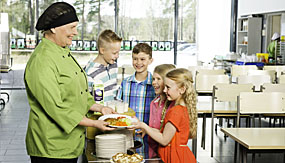
© Jenni Virta/Arkea Oy
The Strategic Procurement unit of the City of Turku will be determining the factors affecting the carbon footprint of the City’s network of kitchens and the food services purchased by the City from the location of kitchens to the amount of food waste. In the future, the carbon footprint will be used as a guiding factor in the design of the kitchen network and in issuing calls for tenders on food services.
“Last year, we examined our own operations in terms of calls for tenders concerning food services. This made us think about how we could impact environmental issues in the operations of school kitchens and other kitchens in the City. We decided to contact the Finnish Environment Institute to determine where the environmental load comes from in terms of meals,” says Service Manager Suvi Haukioja from the procurements unit of the City of Turku.
This led to a project to determine the carbon footprint of the food services of the City of Turku. The service provider’s menus were examined in great detail to reveal the impact of each ingredient. A counter was developed within the project, and it revealed the impact of each of the areas of food services in terms of reducing the carbon footprint.
“Before the detailed examination, we thought that the most significant factor in terms of the carbon footprint was transportation. As the work progressed, however, we realised that the amount of wasted food had a significant impact on the carbon footprint. Because distances are short in Turku, the overall impact of transportation is not very significant,” Haukioja says.
The examination focused on all factors affecting the carbon footprint of food services, such as the heating of buildings, kitchen appliances, food production methods, water and electricity consumption, transportation, the proportion of vegetarian meals of all the food served, and food waste.
More vegetarian meals and reining in food waste
The report provided the City of Turku with insight on how to develop its food services into a more environmentally friendly direction.
“The positive effect that vegetable-based meals have on the carbon footprint stood out. In the future, we will be looking into being able to offer vegetable-based options daily in elementary schools, as well. Then again, the changes may counter our efforts in some places, as offering two options might increase food waste in small schools. We are also considering offering vegetarian options in larger elementary schools to gauge the consumption of vegetarian food and learn more about the management of food waste. The City of Turku and the food services provider are still investigating this issue,” Haukioja says.
“We use green electricity in schools and day care centres, and no particular efforts need to be made there. The appliances in the kitchens vary greatly in age. This was observed in the counter,” she continues.
Food panels to explore new flavours
The food services offered by the City of Turku want to get pupils involved in developing school meals. According to Haukioja, the pupils have varying eating habits – some pupils are very well aware of what they should eat, but others are unfamiliar with vegetarian food, for example.
“We are about to establish food panels for pupils of secondary schools, where the pupils have the opportunity to learn more about different vegetable-based protein options and make their own versions of the vegetarian meals currently on the menu of the service provider together with food service professionals. We will start the experiment in a few schools at first, but we want to establish the practice throughout Turku. It would be ideal if we were able to combine the activities and themes of the food panels with home economics and biology classes, for example,” Haukioja says.
According to Haukioja, it is a very welcome change that the discussion on food has become more versatile in the last few years. We are no longer only talking about nutrients, but also the fact that food must be good for both people and the environment.
“Public operators wield significant power over issues related to food. However, we do not want to be telling people what and how to eat. Food prepared from new recipes must also be enjoyable, and school meals should be a positive thing,” Haukioja says.
More information:
Service Manager Suvi Haukioja, Procurements, City of Turku
suvi.haukioja@turku.fi